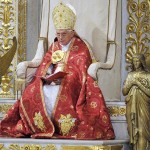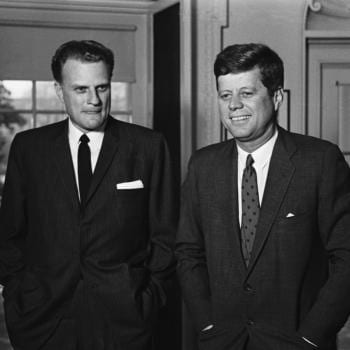A common complaint among Roman Catholics about Protestantism is that it broke up Christendom. What had been a united Christian civilization ended once Martin Luther came along and introduced another version of Christianity. Odd it is that some Americans — even Roman Catholics in the United States — who promote religious freedom and even the freedom of the will don’t like Luther’s dissent or the novelty of presenting Christians with a choice.
Be that as it may, why Protestants take the blame for dividing Christendom is a mystery. Consider Brad Gregory’s book, The Unintended Reformation: How a Religious Revolution Secularized Society. The author lays a lot of blame on the Protestants but the turning point in the history of the West actually preceded Luther by two centuries. It turns out that the Roman Catholic theologians, John Duns Scotus (1266-1308) and William of Occam (1285-1348) were really the ones responsible for introducing novel ideas about God that revolutionized Europe. Gregory writes:
The social, political, wider cultural, and economic impact of Scotus’s idea in the early fourteenth century, a tumultuous period for the church and for Scotus’s Franciscan order, was nil. So why bother with it? Because history is the study of human change over time in all its dimensions, not just the assessment of short-term influence viewed in social, political, cultural, or economic terms. Partly because of its relationship to default ideas about God born of ordinary linguistic grammar, the unforeseen, long-term influences of Scotus’s move have been enormous. . . .
By predicating being of God and creatures univocally, Scotus brought both within the same conceptual framework. However much God differs from creation, according to Scotus the fact of his existence necessitates that he belongs to a more encompassing reality with creatures, one defined by being, conceived in its most abstract, most general sense. This would prove to be the first step toward the eventual domestication of God’s transcendence, a process in which the seventeenth-century revolutions in philosophy and science would participate. . . . (37-38)
Leave aside the fairly rarefied point about Scotus’ view of God. Just consider the chronology. Luther and John Calvin are still a ways away and we already have, by Gregory’s reckoning, a revolution of Copernican proportions in medieval theology with Scotus and Occam. So why are Protestants to blame for the demise of Christendom? Would not have it been possible for Roman Catholic authorities to do something about these novel views? But they did not.
And this raises an even more arresting historical question. Lots of Roman Catholic apologists like to trumpet the disunity of Protestants — “See? These people can’t agree on what the Bible says so Protestantism must be corrupt.” But if western Christianity produced Scotus and Occam, how pure is Roman Catholicism? If Luther and Calvin need to do penance for Methodists and Pentecostals, why don’t Roman Catholics have to do as much penance for Luther and Calvin? After all, the Roman Catholic church gave birth to Protestantism. That’s the chronology.












